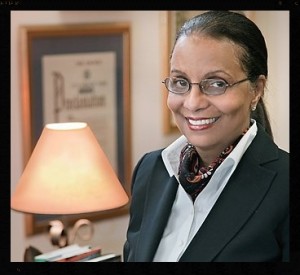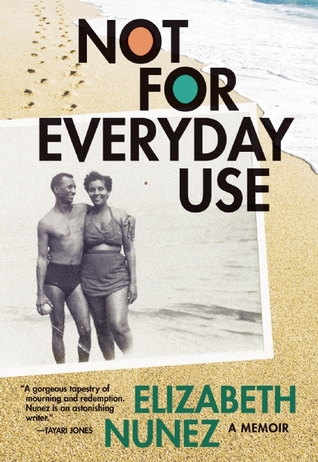 A version of this Q&A appeared in the August 2014 issue of The Practicing Writer.
A version of this Q&A appeared in the August 2014 issue of The Practicing Writer.
During the seven-and-a-half years that I have worked at The City University of New York (CUNY), I’ve had the great luck and privilege of meeting a number of the outstanding teacher-writers who work across the University’s campuses. One of these writers is Elizabeth Nunez, Distinguished Professor of English at CUNY’s Hunter College. I’ve read every book that Elizabeth has published since I’ve met her, and so perhaps I was even more intrigued than any garden-variety reader might have been to discover that she was publishing a memoir earlier this year.
But you don’t need to know Elizabeth or her prior work as a fiction writer to be captivated by the beautiful–and powerful–writing in that memoir, set largely in Elizabeth’s native Trinidad. Titled NOT FOR EVERYDAY USE, it is the subject of this Q&A with the author.
Elizabeth Nunez is the award-winning author of eight novels. Both BOUNDARIES and ANNA IN-BETWEEN were NEW YORK TIMES Editors’ Choices. ANNA IN-BETWEEN won the 2010 PEN Oakland/Josephine Miles Award and was long-listed for the International IMPAC Dublin Literary Award. Nunez also received the 2011 Writers for Writers Award from Poets & Writers and Barnes & Noble, and a NALIS Lifetime Literary Award from the Trinidad & Tobago National Library. She is a Distinguished Professor at Hunter College, CUNY, where she teaches fiction writing. She divides her time between Amityville and Brooklyn, New York. Her memoir, NOT FOR EVERYDAY USE, is her latest work.
ERIKA DREIFUS (ED): Elizabeth, thanks so much for taking part in this interview. NOT FOR EVERYDAY USE is a memoir, yes, but I see it also as a elegy of sorts, intimately linked to the passing of your mother, in particular. When did you realize that this was a book you had to write, and how long did it take you to complete the manuscript?
ELIZABETH NUNEZ (EN): I am a novelist. I love pursuing truth in the fictive worlds I create. I enjoy the freedom that the novel allows the writer, which leads to discoveries, often surprising. So I had not thought of writing a memoir, but my previous two novels, ANNA IN-BETWEEN and BOUNDARIES, both explored characters who were inspired by my parents and my relationship with them, and there were lingering questions about the tensions between the fictive Anna and her parents. My mother’s death propelled me to confront those questions head-on. I wanted to know the demons/challenges my mother faced that caused her to be so restrained with her demonstrations of love for her children. The writing came quickly; I had a first draft within a year, though it took me another year to polish it.
ED: You come from a large family–you are one of eleven siblings, and you’re a mother and grandmother yourself–and so it strikes me that dilemmas that can arise from “writing about family” (some of which are indeed mentioned in the memoir) might loom especially large in your case. What reaction have you received to *this* book from your family members to date?
EN: Well, this memoir tells part of my family’s story. It would take many more memoirs to tell all. I tried to be fair and truthful in my portrayals of my parents and siblings. The memoir, of course, is my truth about what I remembered and how I remembered it. So far, the only objection from my family relates to incidents of my father’s infidelity. But not all of my siblings have read the memoir, so there may be more objections to come. I am not worried about their reactions. I would not deliberately write something that I know will be hurtful to them, but I am committed to telling the truth.
ED: You published many novels before this memoir. Please us what surprised you (or didn’t surprise you) about the experience of writing a book of nonfiction instead of fiction.
EN: One of the advantages of fiction for me is that I can explore my life, the dark side as well as the better side, under the safe veil of fabrication. I think to myself: No one will find me in the characters I write about. I can explore the good as well as the bad, my true motivations for my actions, and so come to a clearer understanding of who I am, and the meaning of human life on earth. Ultimately, though, I still manage to fool myself when the characters I create in my fiction follow paths of their own making. Originally, I thought that since in memoir I would be writing about myself, I would have more control over the thoughts and decisions of the characters. But the need to put a positive spin on the challenges I faced was still very much there. It was only after rereading scenes from the memoir that I discovered that the tensions between my mother and me had roots far deeper than what I had allowed in my fiction. Yes, the daughter resented the fact that her mother had never asked her to return to her homeland after she immigrated to the US, but that resentment came from a much earlier time.
ED: Please tell us about the book’s publisher, Akashic Press, and your history with it.
EN: Akashic Books is one of the rare publishers today that remains committed to the encouragement of literary talent and the development of the public’s taste for literary fiction. When my last mainstream publisher passed on one of my novels, I went straight to Akashic, in spite of my agent’s insistence that we send the novel to other mainstream publishers. But I was tired of working with houses that were more interested in the potential market for my work than in its literary/artistic value. Akashic treated my work with respect and gave me the editorial guidance I needed. To date, two of my novels and my memoir have been published by Akashic. However, as with any business, the bottom line is crucial to Akashic. If the company does not make a profit, it will be unable to achieve its goal, but Johnny Temple, the publisher, has managed to maintain the balance between art and commerce by making smart acquisition decisions.
ED: What is your dearest hope for this book?
EN: It would be great to win a major literary award. It would be great, too, to expand the diversity of my readers.
ED: Anything else you’d like us to know (or writing advice you’d like to impart)?
EN: I teach creative writing, fiction, but I know that the best teachers of creative writing are well-written books.
ED: Thank you, Elizabeth, for taking the time to answer these questions.
To learn more about Elizabeth Nunez and her latest book, please visit www.elizabethnunez.com and www.akashicbooks.com/author/elizabeth-nunez/. My thanks to Akashic for the complimentary review copy.